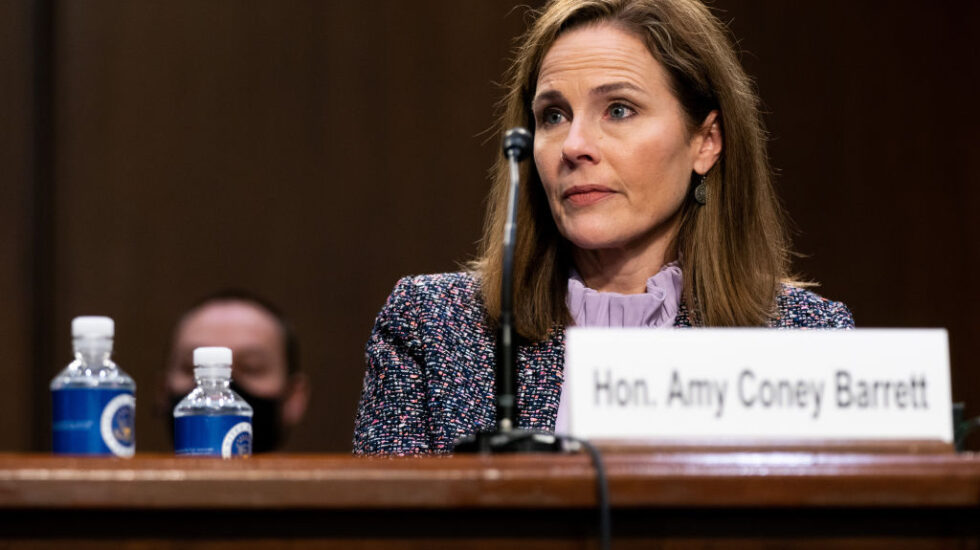Testifying on Wednesday, Supreme Court nominee Amy Coney Barrett agreed with the statement that “No man is above the law” — although Donald Trump may disagree.
Judge Barrett faced a second day of questions from the Senate Judiciary Committee, with Republicans pressing their fast-track plan to confirm her nomination to the high court before the Nov. 3 election.
Senators, particularly Democrats, got few clear answers about issues they considered especially important.
“In her morning testimony, the conservative jurist declined to share her legal views on abortion rights, voting rights and the Affordable Care Act [ACA or Obamacare], seeking to separate her academic writings from how she might rule if confirmed,” reported the Washington Post.
Democrats argued that Barrett’s confirmation would likely mean an end to Obamacare. Multiple senators have noted that Barrett has previously criticized Chief Justice John Roberts’ decision to uphold the ACA.
The rapid approach of Election Day was clearly on the minds of everyone.
“Obamacare is on the ballot,” said Sen. Lindsey Graham (R-SC), the Judiciary Committee chairman, who is facing a strong challenge to his re-election bid. “If you want socialized, single-payer health care, that’s on the ballot.”
Oral arguments in the Supreme Court on the Trump administration’s legal challenge to the ACA are likely to begin on Nov. 10; Barrett is expected to be confirmed to the court well before that date.
Barrett was relatively forthcoming on the nature and reach of presidential power, “including whether a president could defy a Supreme Court ruling or pardon himself,” the New York Times said. At the same time, she was realistic about the high court’s limitations.
Barrett said she agreed with current justices Brett Kavanaugh and Neil Gorsuch that “no man is above the law,” adding that while “the Supreme Court may have the final word, it lacks control about what happens after that.”
That is, the high court has no power to enforce its rulings, and so, Barrett said, “It relies on the other branches to react to its judgments accordingly.”
Asked directly whether the president could pardon himself for a crime, Barrett was circumspect, the Post said.
“So far as I know, that question has never been litigated,” was all she said.
Sen. Patrick Leahy (D-VT) asked Barrett whether a president who refuses to comply with a court order is a threat to the U.S. constitutional system of checks and balances among the three branches of government. She declined to answer.
One striking element of Wednesday’s hearing was the apparent acceptance by committee Democrats of the widely held view that Barrett’s confirmation is virtually certain.
The result was a flurry of Democratic advice for the nominee; things she should consider once on the high court bench, cases she should reflect upon or study with an eye to others likely to come up during her presumed decades as an associate Justice, and so on.
“Sen. Sheldon Whitehouse (D-RI) asked Barrett to promise … that ‘when you’re on the court,’ she would make sure that no lawyer bringing a case to the Supreme Court would have to do so ‘feeling that the case is stacked against them,’” the Post said.
Barrett promised to approach every case with “an open mind.”
“The exchange was an admission of political reality that no Democrat on the Senate Judiciary Committee has yet acknowledged: Senate Republicans, if they stick together, have more than enough votes to confirm Barrett as the next Supreme Court justice.”
Nearing the close of Wednesday’s hearing, the committee met in closed session to hear testimony from the FBI on its evaluation of Barrett’s background.
With the close of Wednesday’s session, the hearing’s finish line was in sight for Judge Barrett.
Thursday will be the fourth and final day of the hearing, and the only one that will include outside witnesses called by the senators. The Judiciary Committee is expected to vote on the nomination on Oct. 22, with President Trump pressuring the full Senate to confirm Barrett before the Nov. 3 election.
The nomination-to-confirmation process typically takes about 70 days; if Barrett is confirmed before Election Day, it will have taken less than 3 weeks.



